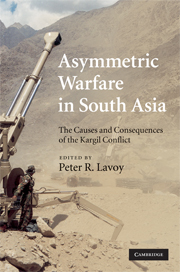Book contents
- Frontmatter
- Contents
- List of maps and tables
- List of contributors
- Preface
- List of abbreviations and acronyms
- 1 Introduction: the importance of the Kargil conflict
- Part 1 Causes and conduct of the conflict
- Part 2 Consequences and impact of the conflict
- 8 Surprise at the top of the world: India's systemic and intelligence failure
- 9 Militants in the Kargil conflict: myths, realities, and impacts
- 10 The impact of the Kargil conflict and Kashmir on Indian politics and society
- 11 The Kargil conflict's impact on Pakistani politics and society
- Part 3 Lessons learned
- Index
10 - The impact of the Kargil conflict and Kashmir on Indian politics and society
from Part 2 - Consequences and impact of the conflict
Published online by Cambridge University Press: 30 March 2010
- Frontmatter
- Contents
- List of maps and tables
- List of contributors
- Preface
- List of abbreviations and acronyms
- 1 Introduction: the importance of the Kargil conflict
- Part 1 Causes and conduct of the conflict
- Part 2 Consequences and impact of the conflict
- 8 Surprise at the top of the world: India's systemic and intelligence failure
- 9 Militants in the Kargil conflict: myths, realities, and impacts
- 10 The impact of the Kargil conflict and Kashmir on Indian politics and society
- 11 The Kargil conflict's impact on Pakistani politics and society
- Part 3 Lessons learned
- Index
Summary
A person in the Indian state of Bihar had offered 111 coconuts and intended to offer 10001 … A large Corporate House and the local unit of the Bhartiya Janta [sic] political party in the city of Bombay offered prayers at the celebrated Siddhivinayak Temple and distributed sweets. A youth in Gujarat went on a fast unto death. No, none of the above commitments were for the well being of the Indian soldiers but for the Indian cricket team.
Naresh Arya's irate assault on his fellow Indians – widely circulated on the Internet during the Kargil war – was sparked off by what he believed to be their outrageous lack of wartime patriotism.
On 7 June 1999, troops of the 56 Brigade were preparing to take the key heights of Tololing and point 4590-meters. These were the first major Indian victories of the Kargil war, and were to come about six days later. At about the same time, Indian television viewers were preparing to watch the showdown between their team and that of Pakistan in the 1999 Cricket World Cup at the Old Trafford ground in Manchester. In the event, India won a low-scoring and generally unremarkable match, beating Pakistan by forty-seven runs. Journalists in the United Kingdom, bored with lamenting the early exit of the British team, had billed the event as something of a war in itself.
- Type
- Chapter
- Information
- Asymmetric Warfare in South AsiaThe Causes and Consequences of the Kargil Conflict, pp. 258 - 279Publisher: Cambridge University PressPrint publication year: 2009
- 1
- Cited by



